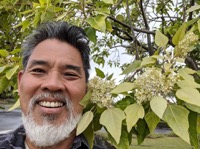Virtual Kahaukani Conversations
Hawaiian Science: ʻIke o ka Poʻe ʻImiloa (Knowledge of a Far-seeking People)

Please join us for our next Virtual Kahaukani Conversations event on Thursday, August 27 at 5 pm on Zoom. Registration is free!
Click the button to go to the registration page; the Zoom link will be emailed to you prior to the presentation. Also, see below for a brief introduction to the talk and a bio of our special guest speaker. We hope to see you there!
Introduction
In his book Ka Moʻoʻōlelo Hawaiʻi, 19th-century kānaka intellectual Kepelino wrote:
“Ahu kupanaha ia, Hawaiʻi ʻimi loa! E noiʻi wale mai nō ka haole-a, ʻaʻole e pau nā hana a Hawaiʻi ʻimi loa.”
A heap of amazing things can be learned about Hawaiʻi! However diligently the foreigner inquires, he cannot completely fathom all of the doings of far seeking Hawaiians.
This presentation on Hawaiian Science, ʻIke o ka poʻe ʻimi loa (Knowledge of a far-seeking people) is inspired by Kepelino’s characterization of Hawaiian knowledge as “imi loa,” “far-seeking.” Learn about the similarities and differences between Hawaiian and Western knowledge systems, and the future of collaborative knowledge and sharing to benefit us all.
About the Speaker

Dr. Sam ‘Ohu Gon III was born and raised in Nu‘uanu and over a 40+ year career in conservation in Hawai‘i has advocated for integration of Hawaiian cultural values and knowledge in conservation efforts. He received his BA in Zoology from UH Mānoa (the first recipient to have Hawaiian accepted as fulfilling the language requirement for a life science degree). He went on to the University of California at Davis to earn his Master’s degree in Zoology (Ecology, Evolution, and Behavior) and his Ph.D. from the Animal Behavior Graduate Group there, conduction a comparative behavioral ecology study of the Hawaiian Happyface Spider (Theridion grallator).
He has worked with The Nature Conservancy of Hawaiʻi for over 30 years and has amassed great personal experience with Hawaiian ecosystems and species on all islands. He was also traditionally trained in Hawaiian chant and ceremony by Kumu John Keolamakaʻāinana Lake, undergoing ʻūniki huʻelepo in 2003, and was conferred the kuleana of continuing the teaching of oli (chant) by Kumu Lake before his passing in 2008. He continues to train chanters in Hālau Mele, currently the hālau-in-residence at The Bernice Pauahi Bishop Museum in Honolulu.
Combining his knowledge of the ecology of Hawaiʻi with the rich traditional knowledge system here, partially documented in the largest indigenous language archive known in the world, his research involves the multidisciplinary exploration of the changes that have taken place in natural and human landscapes here from pre-human to pre-contact and post-contact times. In doing so he documented the remarkably small ecological footprint of pre-contact Hawaiʻi — which was also 100% self-sufficient — and contrasts this with the huge loss of native ecosystems today and our current low level of self-sufficiency. He advocates for the integration of Hawaiian knowledge, values, and approaches in modern conservation efforts, and for this biocultural approach was designated a Living Treasure of Hawaiʻi in 2014.
Kahaukani Conversations is made possible with support from:
Atherton Family Foundation
G.N. Wilcox
Island Insurance
Mālama Mānoa
